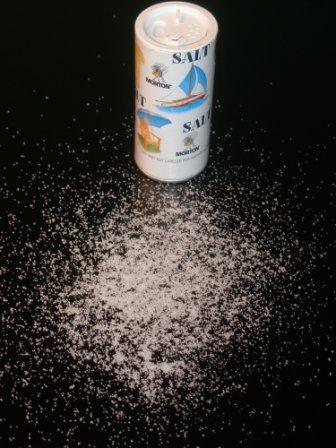 As it gets warmer outside it is time to start focusing on your hydration levels. I’m really into hydration. The most important thing that you need to remember is that hydration isn’t just drinking plenty of water, it’s your body being able to retain those fluids, this is where salt comes in. Get yourself some high quality NaCl.
As it gets warmer outside it is time to start focusing on your hydration levels. I’m really into hydration. The most important thing that you need to remember is that hydration isn’t just drinking plenty of water, it’s your body being able to retain those fluids, this is where salt comes in. Get yourself some high quality NaCl.
I didn’t always realize that salt was needed for hydration, I always assumed the opposite, that it dehydrates you. I quickly learned I was wrong while attending the US Army Ranger School. At Ranger School we were given salt packets to put into one of our canteens, the other canteen was to remain normal water. Even though we were in the hot South GA sun in the middle of summer, physically exerting ourselves for 18 hours a day, and eating so quickly that we only got small amounts of salt from our food, I thought I was smarter than the Army. I deduced that salt wasn’t good for me, it would dehydrate me. So I didn’t add the sea salt to my canteen. I went down hard for dehydration. At one point I became disoriented and was slurring my speech. For this I got about an hour of rest along with your temperature checked about 10 times rectally. Pretty fun but I don’t recommend trying it. So after that I began pounding the sea salt. This technique worked! From despair comes great innovation. Thanks US Army!
When you sweat (and urinate), you loose sodium which you need replenish in order to intake more fluids to hydrate. The more you sweat, the more sodium you loose. It’s just math. Mathematically, during long runs you sweat about 2.25-3.4 grams of salt per liter and about 1 liter per hour. Every body is different so you need to closely monitor your personal hydration levels. Some early signs of dehydration are nausea, muscle cramps, disorientation, slurred speech, confusion, and inappropriate behavior. Try to blame your inappropriate behavior on your low sodium levels next time. In order to avoid this happening you need to focus on the amount of salt you are taking in, especially before a long trail run. You should take about one gram of sodium per hour when on running long races. I like to get my salt intake from pretzels during a long trail run. Also start acclimating yourself to the heat during your training to help your body know better how to react to the loss of salt. The week before a trail race try to intake 10-25 grams of sodium per day. This will give you a good base going into your trail race. Lastly, you should avoid aspirin, ibuprofen, or other anti-inflammatories which decrease your sodium levels. Medicine’s for suckers anyways, headaches are cool.
So stop wasting your salt by throwing it all over your friend’s “game.” Save it for the trail race playa hata.
 I’ve been looking for a knee brace to periodically wear as a preventative measure because my knees are worn down from “jumping” (more like “falling out of a plane and hitting the ground”) from an aircraft in the Army’s 82nd Airborne Division. I thought about getting the standard, black knee brace from Target or somewhere but I decided if this was going to be used as a preventative measure for years to come, I should try to get something a little more sophisticated. I got
I’ve been looking for a knee brace to periodically wear as a preventative measure because my knees are worn down from “jumping” (more like “falling out of a plane and hitting the ground”) from an aircraft in the Army’s 82nd Airborne Division. I thought about getting the standard, black knee brace from Target or somewhere but I decided if this was going to be used as a preventative measure for years to come, I should try to get something a little more sophisticated. I got  Just under a year ago I separated from the Army after serving four years and eight months. The extra eight months I served above my commitment was because I was deployed at the time. So at this point I had gone from High School, straight to college, then into the Army which had been telling me where to live, what job to have, and what I was going to get paid. After separating I finally had the whole world open to me! Well, the world was more like my oyster…really tough to crack open.
Just under a year ago I separated from the Army after serving four years and eight months. The extra eight months I served above my commitment was because I was deployed at the time. So at this point I had gone from High School, straight to college, then into the Army which had been telling me where to live, what job to have, and what I was going to get paid. After separating I finally had the whole world open to me! Well, the world was more like my oyster…really tough to crack open. We have recently added an
We have recently added an